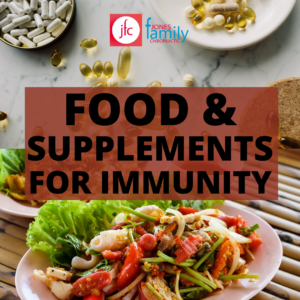Common blood tests for inflammation
At our Chiropractic Office at Elizabeth City, NC, we see a lot of people come in every week with chronic inflammation. Most cases of internal inflammation are often associated with a high level of stress, lack of proper nutrition, and chronic diseases such as heart disease, digestive problems, and cancer.
Inflammation has also been implicated in many autoimmune diseases. In this case, the immune system triggers an inflammatory response that attacks the body like it’s an enemy.
So the question, how do you detect these silent forms of inflammations in specific targets as well as monitor progress? The best approach has been the use of blood tests.
Here are some blood tests or markers used to determine or detect chronic forms of inflammation:
Hemoglobin A1C (HbA1C)
HbA1C is a blood test that measures the amount of glucose in the blood over the past three months. It is a major test to look at a person’s inflammation.
The result is often recorded in a percentage, and higher percentages signify higher blood glucose levels.
The Hemoglobin A1C is used often used on diabetic persons to detect diabetes and monitor blood sugar levels. A high HbA1C means there is a high blood glucose level and this can cause damage to body organs.
Fasting Insulin
Fasting insulin is another blood test for inflammation. The insulin hormone is produced in the pancreas, and it helps the cells get glucose from the blood. These hormones are often released when your body detects a rise in blood sugar.
The body needs constant circulation of insulin, but when it becomes too high or too low, it becomes a problem. An excess amount of insulin in the body can be a sign of insulin resistance, which means your body does not respond well to insulin, thereby making more, and that increases the risk of inflammation in the body.
Serum Ferritin
Serum ferritin is a blood test that measures the amount of ferritin (blood cell protein that stores iron) in the body.
When you have a low level of ferritin, it indicates that are deficient in iron, and that causes anemia.
A high level of ferritin, on the other hand, can indicate inflammation, liver disease, autoimmune disease, chronic infection, and some type of cancer.
Serum ferritin decreases or increases based on inflammation, making it a useful marker for detecting chronic diseases.
C-reactive Protein (CRP)
C-reactive protein is a protein in the liver that increases when inflammation increases and decreases when inflammation decreases.
This test is useful in diagnosing and monitoring chronic inflammatory diseases, including arthritis, inflammatory bowel disease, autoimmune diseases, and psychological issues.
Red blood cell width (RDW)
This test measures the differences in the size of the red blood cells. And it is an excellent way to detect inflammation and oxidative stress.
The red blood cells usually start out large, but they decrease in width as they mature. So how large the cells are will determine how much nutrient and oxygen they can deliver.
Basically, an elevated RDW is linked with many diseases including macrocytic anemia and cardiovascular events.
So there you have it, the best blood tests for inflammation.
Best/Worst foods to eat that drive inflammation
Inflammation is one of the ways your body protect itself from foreign invaders. More so, it helps defend the body from illness. But, sometimes, you may experience inflammation even without a foreign invader, and that’s when it is linked to an increased risk of diseases like heart diseases, diabetes, and obesity. So you can easily say, inflammation can be both good and bad, depending on the situation.
However, one interesting thing is that your diet influences inflammation in your body. Some foods have anti-inflammatory effects and you can add them to your diet to reduce your risk of illness. But some other types of food can trigger and worsen inflammation.
Hence, it is important to note these different types of food so you can combat inflammation effectively, especially when it persists day in and day out.
Best foods to fight inflammation
Here are some anti-inflammatory foods you can add to your diet:
Berries
Berries are loaded with minerals, vitamins, fiber, and antioxidants called anthocyanins. These antioxidants help fight inflammation and reduce your risk of developing diseases.
Some common types of berries you can add to your diet include strawberries, raspberries, blueberries, and blackberries.
Broccoli
Broccoli is a highly nutritious vegetable that contains antioxidants like sulforaphane, which offer anti-inflammatory effects.
Several studies have shown that eating cruciferous vegetables like broccoli have been associated with a reduced risk of cancer and heart diseases.
Fatty fish
Fatty fish contains the omega-3 fatty acids EPA and DHA, which helps to reduce inflammation that can lead to heart disease, metabolic syndrome, kidney disease, and diabetes.
Basically, your body metabolizes the omega-3 fatty acids to yield protectins and resolvins, and these compounds have been studied to show anti-inflammatory effects.
Other good foods that fight inflammation include:
- Green tea
- Avocados
- Mushroom
- Peppers
- Turmeric
- Grape
- Dark chocolate and cocoa
- Extra virgin olive oil
- Cherries
- Tomatoes
Worst foods to eat that drive inflammation
In addition to eating nutritious anti-inflammatory foods, it is also important to avoid or limit the consumption of foods that promote inflammation, including:
Added sugar
Added sugar is one of the major contributors to inflammation. It increases your risk of developing chronic diseases like diabetes, obesity, and heart disease.
You can find these sugars in sneaky places like salad dressings, soft drinks, cookies, cakes, chocolate, sweet pastries, candy, and savory snack foods.
Refined carbohydrates
Refined carbs have a low amount of fiber due to processing, and they have been studied to elicit a quicker and greater effect on blood sugar.
Basically, the fiber in carbs helps improve blood sugar control, promote fullness, and feed the beneficial gut bacteria.
But eating foods that are primarily composed of refined grains or flour, including pasta, bread, and white rice, can put trigger inflammation and increase the risk of type 2 diabetes, obesity, and metabolic syndrome.
Other worst foods that drive inflammation include:
- Red meat (steaks, burgers) and processed meat (sausage, hot dogs)
- Trans fats, such as margarine, partially hydrogenated vegetable oil
- Fried foods, such as fried chicken, donuts, French fries, egg rolls, mozzarella sticks
Do your best to keep a check on your diet to prevent diseases associated with inflammation. Eat more anti-inflammatory foods to support your health.
12 Herbs and supplements to reduce inflammation
Inflammation can be triggered by unhealthy habits and unhealthy foods, and it can in response to stress, trauma, and illness.
However, you can reduce inflammation by managing stress effectively, exercising, and add a lot of anti-inflammatory foods to your diet.
You can also get additional supports from herbs and supplements to reduce or prevent inflammation in your body.
Quickly, let’s take a look at the best-known anti-inflammatory herbs and supplements:
Curcumin
Curcumin is contained in turmeric and it provides several health benefits, including reducing inflammation and improving symptoms of rheumatoid arthritis and osteoarthritis.
Alpha-Lipoic acid
Alpha-lipoic acid plays a key role in metabolism and energy production. It also functions as an antioxidant protecting your cells from oxidative damage.
Many studies show that alpha-lipoic acid reduces inflammation linked to heart disease, insulin resistance, liver disease, cancer, and other diseases.
More so, this supplement helps to restore levels of other antioxidants, such as vitamin C and E.
White Willow Bark
White willow tree bark has been used as an effective treatment for inflammation and pain since ancient Roman and Egyptian times. This herb has a comparable effect to aspirin but does not have side effects common with aspirin.
The recommended dose for white willow bark is 240 mg per day. And herbal blends containing this plant bark can be used to treat acute conditions, such as headaches.
Fish Oil
Fish oil supplements are rich in omega-3 fatty acids, which helps to decrease inflammation linked with heart disease, diabetes, cancer, and many other chronic conditions.
The omega-3s- docosahexaenoic acid (DHA) and eicosapentaenoic acid (EPA) have anti-inflammatory effects that reduce the level of cytokines in the body, thereby promoting gut health. These fatty acids also reduce the risk of muscle damage that may arise after exercise.
Ginger
Ginger is the grounded powder derived from the fresh or dried root of the ginger plant. It offers strong anti-inflammatory properties that are quite similar to some nonsteroidal anti-inflammatory drugs (NSAIDs).
This supplement contains two major compounds- gingerol and zingerone, which reduces inflammation that is linked to kidney damage, colitis, breast cancer, and diabetes.
Some studies also show that ginger supplements help decrease inflammation and muscle soreness after much strenuous exercise.
The recommended dosage is 1 gram daily. However, you can break your dosage into three divisions to make 1 gram per day.
Resveratrol
Resveratrol is a powerful antioxidant found in blueberries, grapes, and other fruits having purple skin. This supplement has been studied to help reduce inflammation in individuals with insulin resistance, heart disease, ulcerative colitis, gastritis, and other conditions.
Resveratrol supplements have also been shown to lower inflammatory markers, blood sugar, and triglycerides in people with obesity.
The recommended amount of resveratrol is 150-500 mg per day.
Flax
The seeds of the flax plant contain both omega-6 and omega-3 fatty acids. Some of the fats in these seeds converts to EPA and DHA, which offers anti-inflammatory properties.
You can get flaxseed in form of capsules, ground meals, oil, or flour. The capsules are available in dosages of 1000 to 1300 mg. However, you can incorporate about 2-3 tablespoons of the ground or milled flaxseed into your food daily.
Other herbs and supplements that help to reduce inflammation include:
- Quercetin
- Spirulina
- MSM
- Devil’s Claw
- Chondroitin
Make sure you buy supplements from trusted manufacturers and follow the dosage instructions.
Why seed oils/manufactured oils drive inflammation and what oils you can use instead
You might have seen some posts warning people about the dangers of seed oils. Well, Millions of people today consume seeds oils in their diets. But these seeds oils, such as canola, soybean, and corn oil have been studied to cause a lot of damages to our bodies.
In fact, they’ve been confirmed by research to drive inflammation, which triggers a lot of chronic health ailments.
Basically, industrial seed oils or manufactured oils are extracted from corn, soybeans, cottonseed, rapeseed, and safflower seeds and refined, bleached, and deodorized to get the final product.
Seeds Oils and Inflammation
The rise of seed oils have caused a dramatic change in the diet of most Americans, but the bad part is that these oils contain a high amount of a type of fat called Omega-6 PUFA.
Although we need a small out of these fats to live, we don’t need nearly as much of them as is contained in the manufactured oils.
We also know of the importance of omega-3 fats, as they are essential to our health, but the Standard American Diet contains more of the omega-6s than the omega-3s and this distorts the ideal ratio, which is 1:1.
More so, several kinds of research have shown that PUFAs cause inflammation which is responsible for many chronic diseases like heart disease, cancer, Alzheimer’s, and obesity.
Not only that, but PUFAs contain GMOs and toxic chemicals that should never be consumed.
An imbalance in the ratio of omega-3 and omega-6 fats in seed oils has been linked with inflammation, which leads to the development of several health ailments, including heart disease, cancer, arthritis, cognitive decline, and inflammatory bowel disease.
More so, the polyunsaturated fatty acids in seed oils or manufactured oils are highly unstable and they oxidize upon exposure to light, heat, and chemical inputs.
Two harmful substances, namely: lipid peroxides and trans fats, are produced when seed oils are exposed to these factors. Trans fats lead to the development of type 2 diabetes and cardiovascular diseases, while lipid peroxides damage DNA and membrane lipids throughout the body.
Essential oils that prevent inflammation
Essential oils can be used in several ways with inflammatory conditions. Some may be best to diffuse, while others may be used in a massage oil for inflamed joints or muscles.
Ginger
Ginger is known as an immune booster and it offers a lot of anti-inflammatory properties. Studies have shown that the anti-inflammatory and antioxidant compounds present in ginger help to reduce both chronic and acute forms of inflammation.
This oil is mainly used in several formulations to reduce joint and muscle pain.
Chamomile
Chamomile is well known to help treat several digestive problems, or anxiety and stress. But it is also one of the best essential oils you can use for inflammation.
It is believed to be useful for most skin issues because it contains compounds that are naturally calming.
Thyme
Thyme has been used for centuries as a medicinal herb. It carries therapeutic properties, which are beneficial for dealing with pain and several types of illness.
This oil also contains potent compounds that help to deal with a variety of health conditions, including inflammation.
Other essential oils for inflammation include:
- Eucalyptus
- Turmeric
- Helichrysum
- Clove
- Lavender
You can consult Dr. Jason Jones at Our Chiropractic Office in Elizabeth City, NC to learn more about healthy oils that you can use for inflammation, thereby preventing chronic diseases and improving your overall health.




